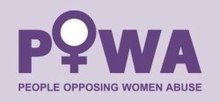 | |
| Founded | 1979; 46 years ago (1979) |
|---|---|
| Website | powa |
POWA, People Opposing Women Abuse, is a South African NGO established in 1979 which undertakes campaigns, projects and research related to violence against women in Africa. POWA was the first organisation in South Africa to establish a shelter for abused women in 1981. In 1999, at the time of the Tuli elephant cruelty case, POWA ran a controversial TV advertisement claiming that many people "care more for abused animals than for abused women".
Projects
Sector Capacity Building and Strengthening
POWA provides training education and mentorship to women's groups so they understand the women's rights discourse and to formalise services that directly affect their current needs.
Law Reform
POWA attempts to influence national, regional and international policy in ways that supports empowering and supporting women.
Rights Education
The responsibility of their branch offices includes rights education through workshops and community meetings.
Sheltering and counselling
Free counselling and shelter is provided to all South African women that are in need of it. POWA has six satellite offices and two confidential shelters.
References
- Francine Pickup, Suzanne Williams, Caroline Sweetman Ending Violence Against Women: A Challenge for Development 0855984384 - 2001 "POWA (People Opposing Women Abuse) in South Africa provides a shelter as one element in its strategy to support women survivors of violence."
- Michelè Pickover Animal Rights in South Africa -2005 1919930906 p89 "To further complicate the matter, two well-respected South African human rights organisations, People Opposing Woman Abuse (POWA) and the Black Sash... POWA ran a TV advertisement claiming that, unfortunately, most people care more for abused animals than for abused women. In a similar vein, the Black Sash ran a newspaper advertisement with the slogan 'The Tuli elephants don't know . "
- "Programmes | POWA". www.powa.co.za. Retrieved 25 May 2018.
External links
This article about an organisation in South Africa is a stub. You can help Misplaced Pages by expanding it. |